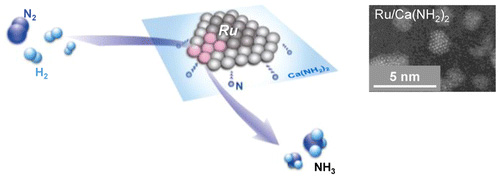Development of highly active and stable ammonia synthesis catalyst under low temperatures
Published: October 20, 2016
Profs. Hosono, Hara, Kitano, Abe and Dr. Inoue found that ruthenium nanoparticles immobilized on calcium amide (Ca(NH2)2) function as an efficient catalyst for ammonia synthesis at 300 ℃ and the catalytic activity is more than 10 times higher than that of the highest performance Ru catalysts reported so far. In addition, 3% Ba-doped Ca(NH2)2 supported Ru catalyst exhibited excellent stability during reaction for 700 h (almost 1 month).
Ammonia is mainly consumed as a fertilizer in crop production and has attracted much attention as a promising candidate for a hydrogen carrier. The present findings will significantly promote the development of the energy-saving processes of ammonia synthesis. Commonly, most of Ru catalysts are supported on metal oxides or carbon materials. In the present catalyst, flat-shaped Ru nanoparticles with a uniform size distribution are distinctly anchored on the surface of Ca(NH2)2 by strong Ru-N interaction. As a result, Ru-loaded Ca(NH2)2 exhibits high catalytic performance and long term stability for ammonia synthesis under low reaction temperatures.
Figure. Conceptual diagram of ammonia synthesis activity at low temperature micro-pressure conditions using a catalyst with a fixed ruthenium on calcium amide (left). Electron microscopic image of the catalyst fixed ruthenium calcium amide (right).
Acknowledgment
R&D Project "Materials Science and Application of Electrides", this work was supported by a fund from Accelerated Innovation Research Initiative Turning Top Science and Ideas into High-Impact Values (ACCEL) of the Japan Science and Technology Agency (JST). A portion of this work was supported by a Kakenhi Grant-in-Aid (No. 15H04183) from the Japan Society for the Promotion of Science (JSPS).
Reference
Authors: |
Yasunori Inoue1, Masaaki Kitano2, Kazuhisa Kishida2, Hitoshi Abe3, 4, 5, Yasuhiro Niwa3, Masato Sasase2, Yusuke Fujita1, Hiroki Ishikawa1, Toshiharu Yokoyama2, Michikazu Hara1, 5, 6*, Hideo Hosono2, 5, 6* |
Title of original paper: |
Efficient and Stable Ammonia Synthesis by Self-Organized Flat Ru Nanoparticles on Calcium Amide |
Journal: |
ACS Catalysis, 6, 7577-7584 (2016) |
DOI : |
|
Affiliations : |
1Institute of Innovative Research, Tokyo Institute of Technology
2Materials Research Center for Element Strategy, Tokyo Institute of Technology
3High Energy Accelerator Research Organization, KEK
4Department of Materials Structure Science, School of High Energy Accelerator Science, SOKENDAI, The Graduate University for Advanced Studies
5ACCEL, Japan Science and Technology Agency
6Laboratory for Materials and Structures, Tokyo Institute of Technology |
. Any information published on this site will be valid in relation to Science Tokyo.



